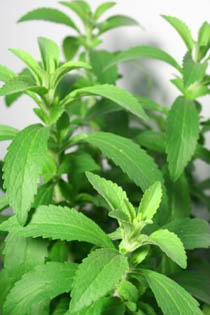Learn the secrets that South American people have known for centuries—stevia is a natural alternative to sugar and artificial sweeteners that won’t add inches to your waist or raise your blood sugar levels. Here’s more sweet news: Stevia may actually help to lower your blood pressure. 1 drop to a cup of salty water in a jar and shake well before gargling. Because plant essential oils are very strong, do not drink this mixture. Simply gargle and split.

Stevia rebaudiana is a South American plant that belongs to the sunflower family. For centuries, the Guarani Indians of Paraguay have used the dried leaves of this herb as a natural sweetener. A little goes a long way indeed. In fact, stevia is up to 300 times sweeter than cane sugar!
Today, stevia is cultivated throughout South America and eastern Asia, with China leading the way in exportation. Japan, which began replacing saccharin with stevia extracts in foods and beverages in the early 1970s, continues to be the largest consumer of stevia, representing more than 40% of the market share.
The Bittersweet Stevia Story
You may be aware of some controversy surrounding this herb and that it has been banned in some places—and you would be correct. Prior to a review conducted by the European Food Safety Authority earlier this year, stevia was banned in much of Europe. As a result of the review, though, it is now permitted as a food additive and for table use with an “acceptable daily intake” of 4 mg per kg body weight per day. As of 2008, the U.S. allows the use of steviol glycoside extracts, specifically rebaudioside A, in food, a ruling that reverses a ban previously enacted on all stevia products in the 1990s.
Why all the fuss over stevia? In the U.S., the ban was initially prompted by a trade complaint registered with the Federal Food and Drug Administration (FDA) by an anonymous industry entity that Rob McCaleb, president and founder of the Herb Research Foundation, describes as having a “strong interest in not having sweet natural products on the market." To this day, the FDA will not divulge the author(s) of that complaint. However, the agency responded to industry pressure by subjecting companies legally using stevia at the time to search-and-seizure raids. They even descended on a small company in Texas to “witness the destruction” of cookbooks and other materials that providing information about the herb. Then, at about the same time, a study conducted at the University of Illinois suggested that two of the plant’s glycosides were mutagenic in rats, meaning that they altered genetic material like DNA. However, the study was later discredited due to finding that its design was so flawed that any material tested would come out looking mutagenic since the researchers used a synthetic, genetically-modified form of stevia extract. Finally, in 2006, the World Health Organization reviewed all of the existing medical literature and concluded that stevia is not carcinogenic to animals or humans and even reported that stevia extracts may provide certain health benefits.
Weight Loss
The extraordinary sweetness of stevia is due to the presence of steviol glycosides in the leaf. Unlike sugar molecules, the human body doesn’t metabolize steviol glycosides. This means that there are no calories taken in. This also translates to good news for folks who are watching their intake of carbohydrates. By comparison, a packet of sugar has about 3 grams of carbohydrates and 11 calories, while a packet of sucralose contains 1 gram of carbohydrates and 3 calories. Stevia weighs in at zero on both counts. Plus, stevia can be used just like any other sweetener, either at the table or in cooked foods, hot and cold beverages and baked goods.
Diabetes
Stevia is the ideal sweetener for diabetics since its compounds do not increase serum glucose levels like sugar and artificial sweeteners do. In fact, there is clinical evidence to indicate that stevia improves insulin sensitivity and utilization, two areas of concern to people at risk for developing diabetes type II.
Blood Pressure
Chinese studies have shown that stevia significantly lowered blood pressure in patients with mild hypertension. One of these studies was a multi-center, randomized, double-blind, placebo-controlled trial that monitored 174 people for two years. Those patients in the treatment group given 500 mg stevioside powder per day experienced lower blood pressure readings within the first week of the trial. An Evidence-Based Systematic Review of Stevia by the Natural Standard Research Collaboration published on April 8, 2010 found sufficient evidence of this effect and recommended further research in this area.
Ready to get cooking with stevia?
Bring one of these sweet treats to your holiday table!